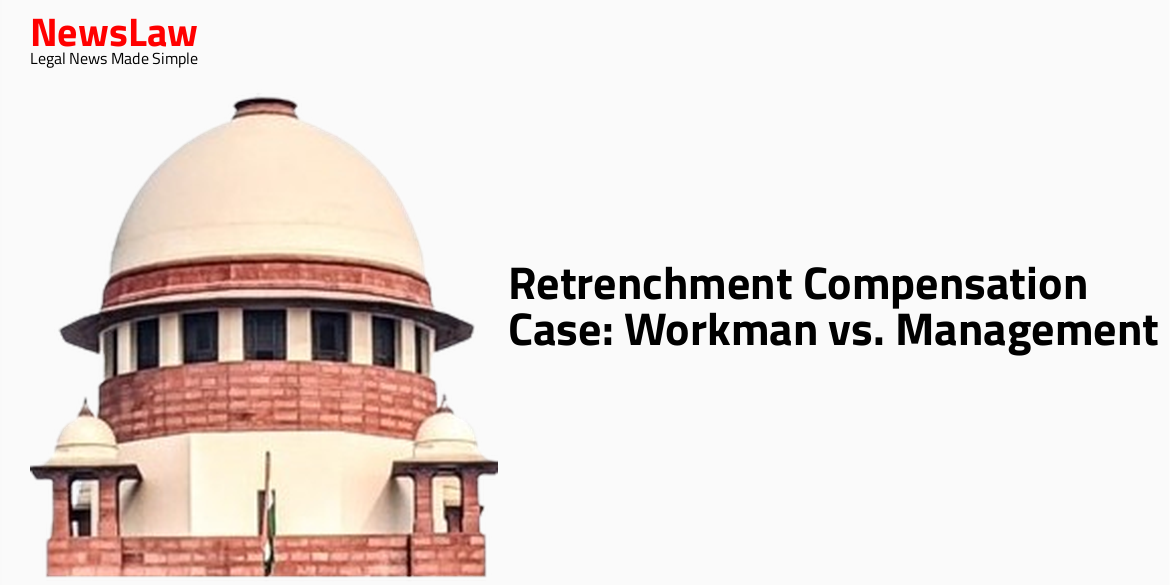In a landmark decision by the Delhi High Court, a case involving retrenchment compensation between a workman and the management was resolved. The court’s ruling favored the workman, awarding compensation for the illegal retrenchment. This case sheds light on crucial labor law issues and sets a precedent for similar disputes in the future.
Facts
- The workman has consistently received a salary designated for unskilled labor and never objected to it during employment.
- The judgment of the Industrial Tribunal did not provide a ‘skilled’ designation according to the scheduled employment rates notified in Delhi.
- The Workman had taken the salary meant for unskilled work all along and had not raised any objections during employment.
- The Labour Court failed to consider the specific details of the employment designation provided in the minimum wage rates for the industry.
- The Workman’s claim and designation were in line with being classified as an ‘unskilled worker’ based on industry standards.
- The Workman’s compliance with the salary for unskilled labor further supports his designation as an unskilled worker.
- The Labour Court decided in favor of the workman, granting him a lump-sum compensation of Rs. 200,000 to be paid within one month.
- The Labour Court observed that reinstatement was not an option as the management was on the verge of closing down, entitling the workman to wages of the skilled/semi-skilled category.
- The argument that the management calculated retrenchment compensation based on the claimant’s last drawn salary instead of the wages of a skilled/semi-skilled worker, as ordered by POIT, was raised.
Issue
- Issue 2: Whether the stayed award of the Industrial Tribunal could be relied upon by the Labour Court for determining the entitlement to compensation.
- The Workman in question was receiving the salary of an ‘unskilled’ laborer from the date of appointment till retrenchment.
- The Court is required to assess if the impugned award by the Labour Court should be challenged under Article 226 of the Constitution of India.
Arguments
- The petitioner argues that the award passed by the learned Tribunal on 29 September, 2009 was done without any documents and was deemed not maintainable in the eyes of the law.
- The petitioner highlights that the interim stay was imposed on the award dated 29 September, 2009 by the Court in November 2013 in W.P (C) no. 3014/2010.
- It is argued that the impugned award by the Labour Court was based on the previously stayed award of 2009, which should not have been considered due to the ongoing legal proceedings.
- The petitioner contends that the workman’s service period of almost 16 years should be considered in calculating retrenchment compensation and other benefits.
- The petitioner emphasizes that the workman had been receiving the salary of an unskilled laborer without objection during his employment.
- The petitioner asserts that the judgments referenced by the Labour Court are not applicable to the current case as they involve different factual scenarios.
- The petitioner questions the need for re-examining the documentary evidence and materials on record in the writ jurisdiction, especially when there is no evidence of illegality or perversity in the Labour Court’s award.
- The compensation in the impugned award was decided based on the designation awarded in the 2009 award.
- The petitioner argues that the workman’s retrenchment in 2010 was illegal and done while the 2009 award was in operation.
- The petitioner emphasizes that the subsequent award of 2017 passed by the Labour Court was done after due consideration of the legal issues, indicating no illegality or perversity in the process.
- Granting designation to the claimant has been stayed by the correctly calculated retrenchment compensation and notice pay as per their last drawn wages and not as per the award dated 29.09.2009.
- Claimant filed a case against his transfer where it was determined by POIT that he was doing unskilled job.
- The award from the case was not challenged by the claimant before any forum, making it final and operating as res-judicata.
Analysis
- The Labour Court was correct in holding that the services of the workman were terminated in violation of Section 25F of the Act.
- The workman was entitled to compensation as per the designation awarded by the Industrial Tribunal in 2009, which was not calculated correctly by the management during retrenchment.
- Seniority lists were displayed and sent to the Labour Department, indicating the workman’s position in the hierarchy.
- The management’s failure to calculate retrenchment compensation as per the skilled/semi-skilled category constituted a violation of Section 25F of the Act.
- The argument that the Labour Court should not have awarded compensation based on the designation due to a previous stay was rejected, as the retrenchment occurred before the stay.
- The workman failed to prove he had not become surplus at the time of retrenchment, justifying the compensation awarded to him.
- POIT findings supported the workmen’s claims for designations in skilled and semi-skilled categories.
- The workman’s continuous service for over 20 years made him eligible for compensation based on the skilled/semi-skilled category, which the management did not adhere to.
- The finding of illegal retrenchment by not providing compensation as per the designated category was upheld
- Section 144 CPC allows for variation, reversal, setting aside or modification of decrees.
- Successful party at the end of proceedings can demand restitution to be placed in the same position as if the interim order had not been passed.
- Judicial decisions establish the principle of restitution to restore parties to their original positions after the interim orders are reversed.
- The case of Shree Chamundi Mopeds Ltd. v. Church of South India Trust Assn. is cited to emphasize the duty of the court to restore parties to their pre-interim order positions.
- The case discusses the distinction between quashing and suspension of orders, highlighting the obligations concerning restitution post-dismissal of interim orders.
- Interest, late payment surcharges, and compensations may be demanded upon dismissal of interim orders, ensuring parties are not deprived of their rightful entitlements.
- The courts must enforce restitution to prevent unjust financial benefits for the losing party due to interim orders.
- The effect of interim orders on pending adjudications is further explained through various judicial precedents.
- Section 25-F of the Act lays down the condition precedent to the retrenchment of a workman.
- Sub-section (a) requires the employer to give one month’s notice in writing indicating the reasons for retrenchment or pay wages in lieu of such notice.
- The Court finds no merit in the petitions and upholds the findings of the Labour Court.
- The petitioner management failed to present convincing arguments in their favor.
- The Labour Court consistently found that the workmen were illegally retrenched without proper compensation based on their designation.
Decision
- The issue before the Labour Court was regarding the legality and justification of the workman’s retrenchment.
- The management is directed to pay Rs.2,00,000/- to the workman within one month from the date of the award.
- Interest of 9% per annum will be applicable if the payment is delayed.
- Each party will bear their own costs.
- The award is to be sent to the Govt. of NCT of Delhi for publication.
- The file is to be archived in the record room.
- The petitions have been dismissed, and the management must pay the compensation to the workmen within three months.
- The judgement will be uploaded on the website immediately.
- The impugned award in all connected petitions is upheld.
- Any pending applications are also dismissed.
- The decision of Labour Court, Karkardooma, Delhi is affirmed.
Case Title: SAWHNEY RUBBER INDUSTRIES Vs. SH. KRISHAN KANT JHA (2024:DHC:4569)
Case Number: W.P.(C)-6510/2020



